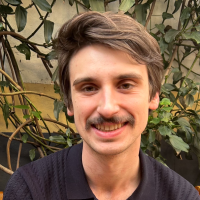Ash Maria (he/they) is a second-year Ph.D. student in Comparative Literature & Literary Theory at the University of Pennsylvania. As a comparativist, Ash is primarily interested in research at the intersection of Baltic, Lusophone, and Slavic studies. Central to his research is looking at the development of otherness and colonial aspiration in Eastern Europe and Russia in the early 20th century. He studies this process by examining literature written by migrants in Brazil, where Eastern Europeans and Russians arrived en masse around the same time when their post-imperial nation states came into being. In Brazil, these authors directly discussed issues of Blackness, Indigeneity, and coloniality–thus giving a novel insight into the how Eastern Europeans and Russians viewed themselves within global racial and colonial hierarchies.
They are also a literary translator from Lithuanian, Portuguese, and Russian and are currently open for commissions. As a current William Fontaine Fellow at Penn, Ash welcomes all prospective student inquiries.
Languages
French, German, Lithuanian, Portuguese, Russian
Only reading: Polish, Spanish, Ukrainian
Research Interests
Eastern European and Russian diasporas in the Global South; émigré writing; twentieth- and twenty-first-century Eastern European and Russian literature and culture; Brazilian literature and culture; international avant-garde movements; literary translation; visual poetry
Literary Translations
"stigmas on the body of air…" – translated poem from Russian by Ekaterina Derysheva for American Academy of Poets Poem-a-Day project (forthcoming)
Five Poems – translated poems from Russian by Ekaterina Derysheva for Asymptote (summer 2024)
Leave Me Only a Song — translated poem from Lithuanian by Paulis Širvys for the University of Pennsylvania's DoubleSpeak Magazine (2022-2023 issue).
Sight for Trees — translated poems from Russian by Anton Ochirov for exhibition in Podroom Gallery, KCB, Belgrade and Depo Gallery in Istanbul. Hosted by SKLAD Cultural Space, Abkhazia (fall 2022).
Conference Participation & Lectures
2024 -“U.S. Slavic Graduate training today: new directions, new challenges, and how to apply.” Invited lecture at the University of São Paulo
2024 - “Nova Lituania and the Possibility of Ironic Colonialism.” Yale European and Eurasian Studies Graduate Student Conference
2024 -“Reading Brazilian Concrete Poetry in an Eastern European Futurist Tempo.” Crossing the Slavic Atlantic: An Interdisciplinary Workshop on Ibero-Slavic Encounters, University of Exeter
2023 - “Antanas Škėma as Creative Martyr and the Neurasthenia of Survival(s).” Princeton Slavic Graduate Conference 2023: The Art of Self-Obsession?
Teaching
Fall 2024 - TA for RUSS250-401/CINE 250-401 - Andrei Tarkovsky: Cinema, Spirit and the Art of the Long Take (Instructor: Kevin M. F. Platt)
